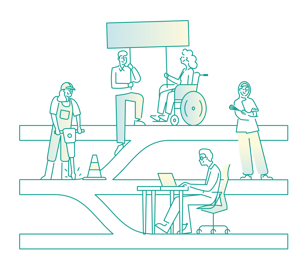Our external advisors bring a mix of personal and professional experience to our themes, helping to refine funding priorities and ensure work is informed by diverse voices, including those with lived experience.
Within Work Pathways, Lauren has supported our upcoming open call for programme awards – more information here – which will seek to fund projects with potential for ‘big change that lasts’ around in-work poverty. This open call will launch in May.
Through recent work with Poverty Alliance and The Robertson Trust, it has been great to have my voice heard and valued around in-work poverty. However, I must admit I was surprised to be asked. Poverty. I’m not in poverty….am I?
When I think of poverty, I think of not being able to feed your children. Being exploited with lower than legal wages. Or your house being in disrepair. My generation has seen various economic crises and crashes. Before I was aware of what was going on, I’d heard of the credit crunch, the housing market crash, austerity - and now we have COVID, cost of living and recession.
Beyond my gender I haven't experienced many of the injustices that life can throw at people - I'm white, non-disabled, and I don't have children. It’s hard to admit I’m struggling when I see others worse off. After all, at least I have a job, right?
In reality, this strong sense of personal responsibility for my own finances discourages seeking help and fosters guilt. Not identifying with being in poverty does the same.
I see my peers who are financially thriving all over social media and feel like a failure in comparison. Consequently, I’ve felt the need to overexert myself and put up with unfair employment practices. I’ve worked three jobs at the same time to prove I’m not lazy. I’ve been denied my legal right to holiday pay without knowing how to challenge. And I’ve been unable to unionise because colleagues are reluctant to rock the boat in a casual job.
I’ve found hospitality to be a challenging and enjoyable environment. Successfully running a kitchen or having control of a restaurant floor on a busy shift has felt like more of an accomplishment than experiences I’ve had in office work. Yet there is no clear route for people in hospitality to move up or use these skills in other sectors.
The industry is difficult, taxing and thankless, with customers consistently asking, “so what do you really do?”. It is associated with tourism, nightlife, entertainment but rarely valued for the skills and expertise you gain with that experience.
I’m also part of the first generation predicted to be poorer than its predecessors.
Although I am physically exhausted from my full-time job, I’m simply not able to save or build more stability in my life.
However, what I’ve come to realise is that working this hard and not feeling up to par is not only not sustainable, it’s also a consequence of the wider environment. The gap between rich and poor is widening and it’s a helpless feeling to be trapped there.
I’ve heard about awful practices within hospitality and it’s only getting worse. Rising costs equals less staff, less hours, and customers having less disposable income. Remaining staff are expected to fill that gap, with customers demanding the same service (or better, given prices are rising)...And if that can’t be fulfilled then yet another popular cafe or restaurant will have to close its doors. Is it better to be overworked IN a job rather than be out of work?
Although this isn’t necessarily a new problem, today’s statistics and stories highlight the intensifying threat of poverty within employment. We require new approaches and new ways of thinking if this is to be addressed successfully. And we require that those in the thick of it, who truly understand the reality of working hard for not enough, are not only listened to but also at the centre of building solutions.
Work Pathways Open Call
Something is wrong in the world of work in Scotland. Nearly half of those in poverty in Scotland are part of working household. This figure climbs even higher when we look at children living in such conditions. Work used to mean people could escape poverty. Now, too often and for too many, it is work that is trapping people in poverty they can’t escape from – or at least not for long.
Our Programme Awards aim to support work which is bold, innovative and sustainable – in other words, work with potential to deliver big change that lasts. While we recognise the importance of addressing individual barriers to employment, our discovery work has shown that illuminating taking the path towards a fairer, more prosperous Scotland for all requires a change to the systems and situations the structural factors that are causing and exacerbating in-work poverty. This is the focus of our recently-launched funding open call.
Be it through work to change policy – such as influencing projects, activism, and research focused on change – or work to change practice – such as feasibility work, development work and test and demonstration work –we want to see these funds being used to address the root causes of in-work poverty and deliver sustained change long after a project’s lifetime. Inspired by the conversations we’ve had and people we’ve met throughout our discovery phase, we are excited and optimistic about the potential for change.
'Big change that lasts'
Last year, we ran a webinar looking at what we mean by 'big change that lasts' for our programme awards (originally recorded for our Education Pathways open call). While the full webinar can be viewed here, we have also provided two bitesize snippets below looking at the definition and examples of big change projects.

